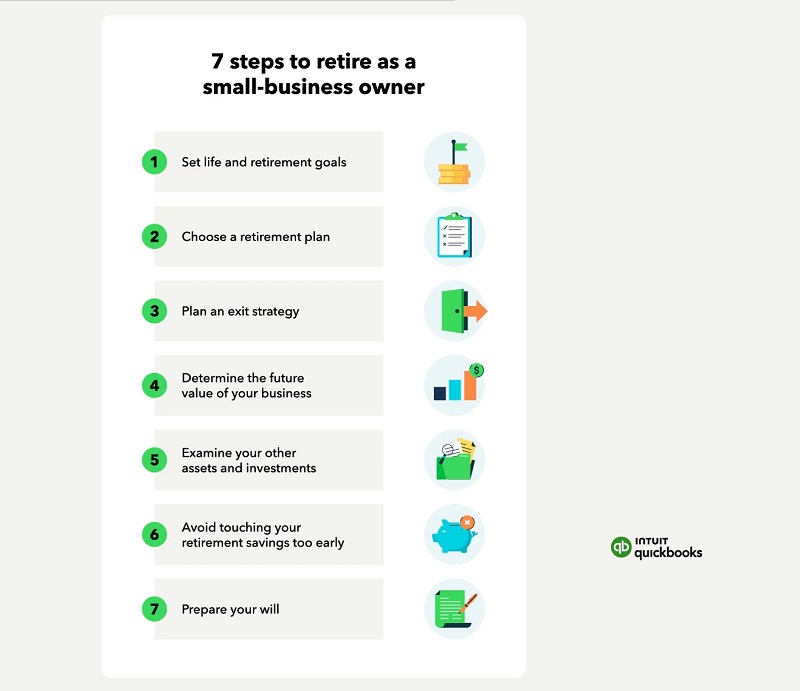
Investing for Long-Term Success: Small Business Owners’ Guide to Building Wealth
December 15, 2024
5 Financial Planning Tips to Help Your Small Business Thrive
December 31, 2024Planning for retirement is a crucial aspect of financial security, yet small business owners often find themselves prioritizing their business needs over personal savings. Unlike traditional employees, small business owners rarely have access to employer-sponsored retirement plans, making it imperative to take proactive steps toward building a secure future. This article highlights five crucial strategies for small business owners to ensure a financially stable and fulfilling retirement.
1. Start Early and Establish Clear Retirement Goals
One of the most effective strategies for retirement planning is to start early. The earlier you begin, the more time you have to benefit from compound interest and build a substantial nest egg.
Define Your Retirement Vision
- Lifestyle Goals: Determine the type of lifestyle you envision during retirement. Do you plan to travel extensively, pursue hobbies, or live a modest life close to family?
- Financial Needs: Calculate your estimated annual expenses, factoring in inflation and healthcare costs.
Leverage Compound Interest
Starting early allows your investments to grow exponentially. For instance, investing $10,000 annually for 30 years at a 7% annual return can grow to over $1 million. The same investment over 15 years would result in significantly less.
Set Milestones
Break down your goals into achievable milestones. This helps track progress and maintain motivation throughout the years.
2. Diversify Your Retirement Savings Options
Small business owners have various retirement savings vehicles available, each with unique benefits. Diversification ensures a balanced approach to mitigating risks and maximizing returns.
Individual Retirement Accounts (IRAs)
- Traditional IRA: Contributions are tax-deductible, but withdrawals during retirement are taxed.
- Roth IRA: Contributions are made with after-tax income, but withdrawals are tax-free.
Simplified Employee Pension (SEP IRA)
- Ideal for small business owners with few or no employees.
- Allows contributions of up to 25% of your net earnings or $66,000 annually (as of 2023).
Solo 401(k)
- Designed for self-employed individuals and business owners without employees.
- Offers high contribution limits, combining employee and employer contributions.
Defined Benefit Plans
- These provide a fixed, pre-determined benefit at retirement.
- They are more complex but suitable for business owners seeking to maximize contributions and secure predictable income.
3. Build a Sellable Business for Retirement Income
Your business is likely one of your most valuable assets. Planning to sell or transition it can provide significant retirement income.
Develop an Exit Strategy
- Sell to a Successor: Identify and groom a family member or employee who can take over.
- Sell to a Third Party: Prepare your business for sale to an external buyer by increasing profitability and organizing finances.
Value Your Business Accurately
Engage with a financial advisor or business appraiser to determine your business’s worth. Regular valuations can help you understand its market position.
Invest in Business Improvements
Focus on enhancing operational efficiency, diversifying revenue streams, and reducing liabilities to boost the business’s appeal to potential buyers.

4. Balance Business Investments with Personal Savings
Small business owners often reinvest their profits into their business, neglecting personal savings. While investing in your business is vital, it shouldn’t come at the expense of your retirement fund.
Separate Personal and Business Finances
Maintain distinct accounts for personal savings and business operations. This provides a clear picture of your financial health and ensures dedicated contributions to retirement.
Automate Retirement Contributions
Set up automatic transfers to your retirement accounts. This “pay yourself first” approach ensures consistent savings.
Monitor Your Portfolio
Diversify investments outside of your business to mitigate risks. A well-balanced portfolio might include stocks, bonds, mutual funds, or real estate.

5. Plan for Healthcare and Long-Term Care Costs
Healthcare and long-term care are among the most significant expenses during retirement. Small business owners must account for these costs to avoid depleting their savings.
Health Savings Accounts (HSAs)
- HSAs offer triple tax benefits: tax-deductible contributions, tax-free growth, and tax-free withdrawals for qualified medical expenses.
- Funds can also be used for long-term care premiums.
Long-Term Care Insurance
- This insurance covers services not typically included in health insurance, such as nursing home care or in-home assistance.
- Purchasing early ensures lower premiums and broader coverage.
Medicare Planning
Familiarize yourself with Medicare options and supplemental insurance to minimize out-of-pocket expenses. Understand coverage gaps and budget for them accordingly.
Bonus Tips for Small Business Owners
1. Stay Educated on Tax Benefits
Leverage tax-advantaged accounts and deductions to maximize savings. Work closely with a tax advisor to explore opportunities to minimize tax liabilities.
2. Create a Contingency Plan
Life is unpredictable, and unforeseen circumstances can derail even the best-laid plans. Establish an emergency fund to cover business or personal financial crises without tapping into your retirement savings.
3. Work with a Financial Advisor
A professional can offer tailored advice based on your unique circumstances, ensuring you’re on track to meet your retirement goals. They can also help you navigate complex investment and tax strategies.
Frequently Asked Questions (FAQs)
Q: What is the best retirement plan for small business owners?
A: The best plan depends on your specific needs. SEP IRAs, Solo 401(k)s, and defined benefit plans are popular options due to their high contribution limits and tax advantages.
Q: How much should I save for retirement as a small business owner?
A: Financial experts recommend saving 10–15% of your annual income. However, the exact amount depends on your retirement goals, lifestyle expectations, and age at which you start saving.
Q: Should I sell my business to fund my retirement?
A: Selling your business is a viable option but should not be your sole retirement strategy. Diversify your investments to reduce reliance on a single income source.
Q: How can I protect my retirement savings from market fluctuations?
A: Diversify your portfolio across asset classes and adjust your investment strategy as you approach retirement. Consult with a financial advisor for personalized guidance.
Q: What happens if I start saving for retirement late?
A: While starting early is ideal, it’s never too late to begin. Focus on maximizing contributions to tax-advantaged accounts and exploring catch-up contributions if you’re over 50.
Q: Can I use my business profits for retirement contributions?
A: Yes, small business owners can allocate a portion of their profits to retirement accounts like SEP IRAs or Solo 401(k)s. Be mindful of maintaining a balance between business growth and personal savings.
Conclusion
Retirement planning is a critical process that requires careful consideration and consistent action. For small business owners, the dual responsibility of managing a business and securing personal financial stability can be challenging. By starting early, diversifying savings, preparing an exit strategy, balancing investments, and planning for healthcare, you can build a robust retirement plan. Remember, seeking professional advice can make a significant difference in achieving your retirement goals.
Resources
- Provides detailed information on SEP IRA contribution limits and guidelines for small business owners.
Health Savings Accounts for Small Businesses
- Offers insights into the benefits and setup of Health Savings Accounts (HSAs) for small business owners.
Long-Term Care Insurance Tax Advantages for Business Owners
- Explains the tax benefits associated with long-term care insurance for business owners.
DISCLAIMER: The information in this article is for informational purposes only and is not meant to take the place of legal and accounting advice.



